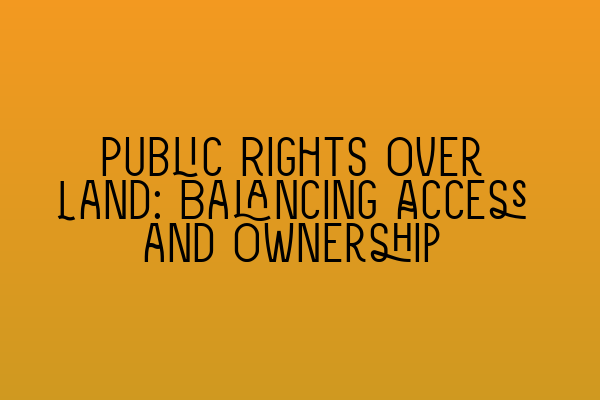Public Rights Over Land: Balancing Access and Ownership
Welcome to the SQE Property Law & Land Law blog! In this article, we will delve into the intriguing topic of public rights over land and the delicate balance between access and ownership. As a property solicitor, understanding the intricacies of public rights over land is vital to providing effective legal advice and representation to clients. So, let’s begin exploring this fascinating area of property law.
Before we proceed, if you’re looking for guidance on preparing for your SQE Property Practice exam, check out our comprehensive article on SQE Preparation for Property Practice: Mapping Out Your Strategy. It will help you map out a winning study plan.
What are Public Rights Over Land?
Public rights over land refer to the legal rights that individuals and communities have to access and use certain areas of land owned by others. These rights can be based on historical customs, statutes, or legal decisions. They aim to strike a balance between the interests of the public to access and enjoy the land and the private property rights of the landowners.
In the UK, public rights over land are primarily governed by common law, statutory laws, and regulations. The most common types of public rights over land include rights of way, rights to access beaches and riversides, and rights to use public parks and recreational grounds.
The Importance of Balancing Access and Ownership
Balancing public access and private ownership is a challenging task for property law practitioners. On one hand, public rights over land are crucial for enabling people to connect with nature, access amenities, and maintain their quality of life. On the other hand, landowners have legitimate expectations of privacy, security, and control over their property.
Effective legal solutions must consider the competing interests and find a middle ground that respects both public and private rights. Courts often employ the “reasonable user” test to determine the scope and extent of public rights over land. The test evaluates whether the exercise of public rights unreasonably interferes with the landowner’s enjoyment of their property.
The Role of Statutory Regulations
Statutory regulations play a crucial role in defining and protecting public rights over land. These regulations help ensure that public access is maintained while safeguarding the property rights of landowners.
It’s important for property law practitioners to stay updated on the latest updates and changes in UK property laws. Our article on Updates in UK Property Laws: Key Changes and Implications provides valuable insights into the recent developments in property law and their implications for legal practice.
Legal Challenges and Considerations
Dealing with public rights over land can present numerous legal challenges for both landowners and users. Disputes may arise regarding the extent of public rights, maintenance responsibilities, and potential infringements on private property rights.
Our comprehensive guide on Legal Challenges in Property Transactions: A Comprehensive Guide covers various legal issues that may arise in property transactions, including public rights over land. It offers practical tips and strategies to navigate these challenges successfully.
Guidelines for Tenants and Landlords
If you’re a tenant or a landlord, understanding public rights over land is essential for navigating lease laws effectively. Our article on Navigating Lease Laws in the UK: Essential Guidelines for Tenants and Landlords provides valuable guidelines on handling public rights over leased properties in compliance with relevant laws and regulations.
Avoiding Common Pitfalls
When dealing with property law questions, it’s crucial to avoid common pitfalls that can negatively impact your case. Our article on Dominate Property Law Questions: Avoiding Common Pitfalls offers valuable insights and tips to help you prepare and avoid common mistakes that many law students and practitioners make.
We hope you found this article on public rights over land informative and useful. If you have any further questions or need legal advice regarding this topic or any other property law matters, don’t hesitate to reach out to SQE Property Law & Land Law. Our team of expert solicitors is here to assist you.
